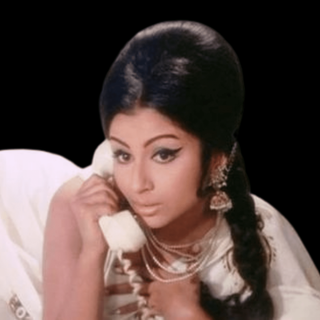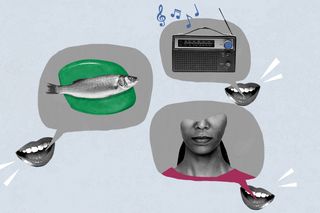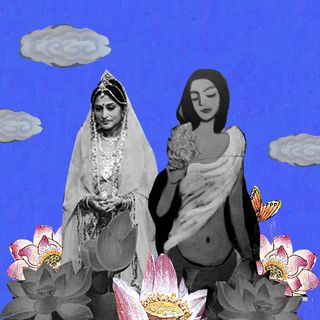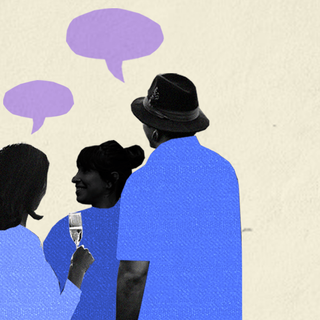
How Making Fun of Cultural Stereotypes Keeps People From Bonding With Their Communities
“To guard myself against personal attacks, I actively avoid speaking in my regional dialect.”

In her slam poem, Meghna Yesudas narrates an incident when someone told her, “Tu South Indian hai na, isiliye kaali hai (You’re dark because you’re ‘South Indian’).” When she went home, she tried to scrub off her “darkness” using a variety of home remedies. Growing up as a Malayali girl in Mumbai, she was tired of constantly being mocked for her cultural background. Of course, she couldn’t rid herself of physical attributes like her skin color, but to “fit in,” she actively distanced herself from other aspects of her culture — like eating fish curry after her classmates once commented, “Ew, what is that? It stinks!”
When I first watched Yesudas’ performance on YouTube last year, I could immediately relate. I hail from a Bengali family. But growing up in Bihar, I was constantly mocked for belonging to a fish-loving, Rabindrasangeet-enamored, politically-enthused community. To blend in, I pretended to hate fish, Rabindrasangeet, and politics, among other stereotypes associated with being Bengali. What I found interesting about Yesudas’ video was how our experiences and reactions bore such stark similarities — even though we’re from two completely different parts of the country.
Turns out, it is a rather common Indian experience. Given our obsession with stereotyping people for fun and banter — without sparing a thought about its consequences on the collective psyche — this is unsurprising. “We’re all for sharing Santa-Banta jokes. And Sindhi jokes. And Bong jokes. And Mallu jokes. And Tam jokes. Because if there’s one thing that unites most Indians, it’s the ability to spot the funny in the real. Never mind political correctness,” an article in Hindustan Times states.
It is ironic indeed that people who pride themselves on India’s supposed diversity — at least, on paper — discourage it through jokes steeped in cultural stereotypes that often reflect varying degrees of racism, communalism, and casteism. We have, in fact, normalized stereotype-based jokes to a point where they seem harmless. But they aren’t.
While these stereotype-based jokes may not be unique to India, given that we’re among the most ethnically diverse countries in the world, we have a lot to lose. These jokes rob many of their cultural identity — by associating them with “guilt and shame,” according to Snehal Singh, a Mumbai-based psychologist. This is especially alarming in the context of people who belong to communities whose languages (and along with them the treasure trove of their traditional knowledge) are already endangered. At present, 191 languages spoken in India are considered to be at different degrees of vulnerability. The kind of homogeneity these stereotypes encourage, amplifies the existing threat.
Related on The Swaddle:
Students Demand Northeast Culture, History Be a Part of School Textbooks to Counter Racism
Singh explains the experience of being mocked about one’s cultural identity can be traumatic and makes one constantly question whether their culture is “good enough.” She categorizes it as manifestations of verbal and emotional abuse that result in “early-life trauma” induced by ostracization, a crisis of belonging, and the idea that the world won’t appreciate one for being themselves. With every subsequent instance of mocking, an aversion to one’s own culture grows.
Over time, people start seeing their culture as the root cause of their otherization by their peers. Eventually, rather than being angry at the perpetrator, they begin directing their anger towards their own culture. In the process, they either try to hide it, or run away from it. Singh mentions a friend who spent years refusing to acknowledge her maternal Assamese roots because she didn’t want to be mocked as “Chinese.”
“To a large extent, this can hinder the development of a person’s self-identity [by shrouding it in shame],” she says. The lack of self-acceptance makes way for dissociation from one’s culture — and at times, even their families, who they see actively practicing the culture they’ve begun resenting. Given that families have the potential to serve as important support systems for people, can one really justify damaging it for the sake of a laugh?
While growing up in Mumbai, Singh herself was mocked for hailing from Varanasi in Uttar Pradesh. Several times, she found herself at the receiving end of comments like “Aap toh ‘Bhaiya’ ho (You’re such a ‘Bhaiya‘).” ‘Bhaiya’ translates to “brother,” but in the context of mocking people from U.P., it is considered a slur. As a child, she began dissociating from her roots because of being shamed. However, the privilege of a degree in psychology enabled her to undo some of the damage.
Not everyone is as fortunate. “Being stereotyped still affects me,” says 24-year-old Naveen. As a Tamil boy growing up in Pune, he, too, had to deal with unkind remarks from his peers, whose knowledge of South India was based on caricaturish portrayals in movies like Chennai Express. Naveen’s experience made him close up to people as he grew. “This attitude still affects my professional life and personal life. At times, I am too afraid to pitch my ideas at work out loud, or to even ask someone out on a date in more casual environments,” he explains.
Related on The Swaddle:
Many Indian Families Express Care Through ‘Bullying,’ Creating Patterns of Abuse
To date, I hesitate to tell people that my family had migrated to my hometown in Jharkhand from Dhaka — leaving their hearth and home behind during the 1947 partition. I worry that on learning my origin, people will call me a “refugee.” It’s not a baseless fear. I defended the inaccuracy of the remark the first few times I was mocked thus, then chose to avoid bringing it up. It breaks my heart to think of how a condition of displacement can be weaponized for a joke. But my experience also speaks to the pervasiveness of the stereotype – it has endured for over half a century, and even passed across generations. Perhaps, the jingoism embedded in it had a role to play there. I wonder now how my father, who was born before India’s independence, was treated while growing up here. Or, maybe, like me, he hid it too.
As a child though, to guard myself against these personal attacks, I actively avoided picking up the regional dialect several members of my joint family spoke at home. So, it doesn’t surprise me to hear Yesudas say she never learned to read Malayalam.
Naveen chose to shut people out while Yesudas and I shut our cultures out of our lives; none of us ever embraced their glorious aspects. Had it not been for the stereotypes, maybe, I would’ve chosen to learn Rabindrasangeet instead of classical music, given how much I have now realized I like the former. Growing up, perhaps, I could’ve read Satyajit Ray’s works in Bangla instead of reading abridged versions in English, and never being privy to the elements that got lost in translation. Maybe, my relationship with my family could have been deeper too had it not been for the jokes — who’s to say!
However, for most millennials, it might not be too late to start reconnecting with parts of our cultural roots that we genuinely enjoy — especially for those of us whose community histories haven’t been wiped out by the emphasis on homogeneity yet. As Yesudas says in her poem, “So what if the stories are in a language I never learned to read? I know that they will always, always speak to me.”
Devrupa Rakshit is an Associate Editor at The Swaddle. She is a lawyer by education, a poet by accident, a painter by shaukh, and autistic by birth. You can find her on Instagram @devruparakshit.
Related


What Happens When You Take the Male Gaze Out of Mythologies
